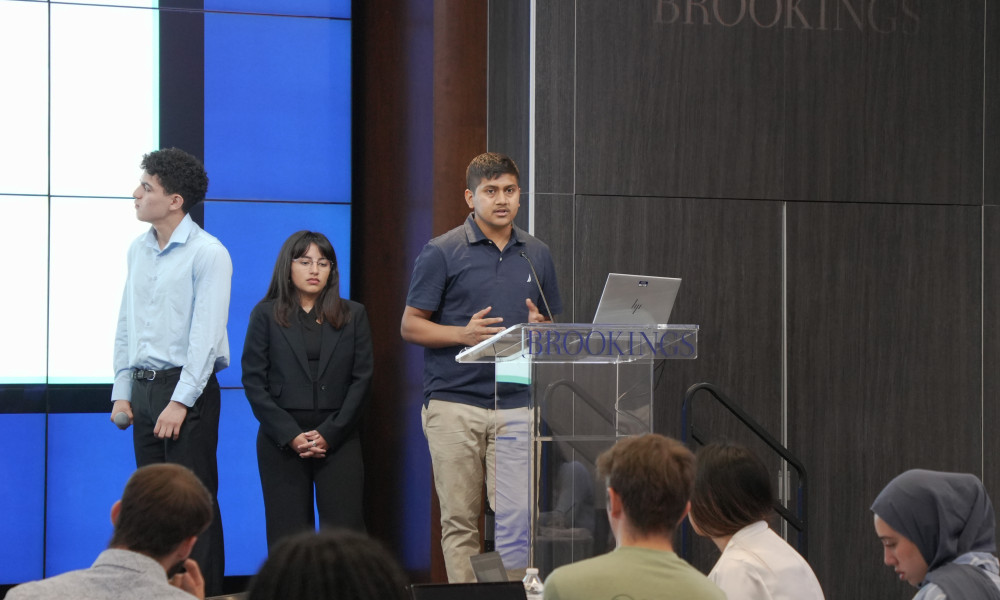Travel Tips
Lorem ipsum dolor sit amet, consectetur adipiscing elit.

By Arun Dahal Khatri
In the summer of 2024, I had the incredible opportunity to attend the Expanding Diversity in Economics (EDE) Program at the University of Chicago's Becker Friedman Institute for Economics. This experience was nothing short of transformative, as I immersed myself in economics, learning from some of the brightest minds in the field while expanding my perspective on global economic challenges and solutions.
When I arrived, the energy at the University of Chicago was palpable. The program offered diverse lectures, discussions, and workshops, each designed to help us gain a deeper understanding of economic theory and application. What I appreciated most was the emphasis on academic rigor and real-world application. Every session brought something new that challenged my prior knowledge or gave me fresh insights. One of the standout sessions for me was delivered by Michael Greenstone. His presentation on Energy economics opened my eyes to the complex challenges of balancing economic growth with environmental sustainability. As someone passionate about global development, I found understanding how energy policy plays into broader economic frameworks fascinating. Greenstone's ability to tie these macroeconomic challenges to tangible policy solutions made the session particularly impactful.
Another memorable session was led by Diego Mendez-Carbajo, who facilitated a session on FRED Data and awarded us the FRED Data Practitioner badge. This was a convenient session, as I now feel much more equipped to navigate and utilize large datasets in future economic research. This was an important takeaway because it's a skill often understated but crucial for empirical research. Throughout the program, I also had the pleasure of attending insightful presentations by some of the world's most renowned economists. Professor Jim Heckman and Erik Hurst both presented on topics spanning labor markets and inequality, offering a fresh perspective on how we can approach these age-old problems through data-driven analysis. These sessions left me thinking critically about how economic policies can create long-lasting impacts on both individual and societal welfare.
Two of my favorite sessions were taught by Professor Fiona Hurling and Chad Syverson, who led the courses on Econometrics and Microeconomics. I have always been drawn to econometrics for its ability to explain economic phenomena through statistical models, and Professor Hurling's ability to make such complex topics understandable was a true gift. Similarly, Syverson's microeconomics session helped connect theoretical principles to real-world issues such as market structures and pricing strategies. Another remarkable moment during the program was attending Professor John List's session on Data and Scale, aptly titled "Welcome to The Show." Professor List introduced us to the Voltage Effect, which is the idea that scaling economic initiatives doesn't always produce the desired results due to unforeseen inefficiencies. His ability to explain the intricate relationship between data and scale was fascinating and challenging, prompting us to think critically about the limits of economic models in practice.
Beyond the structured lectures, I also had the privilege to converse with several influential economists. I'm incredibly grateful to Professor Matthew Notowidigdo for his insightful session on Labor and Health Economics, as I am particularly interested in these areas. His analysis of labor market outcomes in response to health shocks links microeconomic behavior and broader macroeconomic policies. One of the program's highlights was a meeting with Austan D. Goolsbee, the current President of the Federal Reserve Bank of Chicago. As someone deeply interested in monetary policy, it was an honor to ask him about the Federal Reserve's challenges in managing the current tight monetary policy environment. President Goolsbee's candid discussion about the difficulties of balancing inflation control with fostering economic growth was both enlightening and inspiring. His optimism, despite the complexity of the macroeconomic conditions, gave me a deeper understanding of central banks' role in shaping our economy.
In addition to these incredible experiences, I had the unique opportunity to visit key institutions in Washington, D.C., including the Federal Reserve, Brookings Institution, World Bank, and International Monetary Fund (IMF). Each visit added layers to my understanding of how different organizations approach economic development and policy. These visits were educational and highly motivating, reminding me of the impact that young economists like myself can have on global growth.
During my visit to the World Bank, I had the honor of meeting Mr. Deon Filmer, Director of the Development Research Group. Our discussion centered around the success of the World Bank's projects in South Asia, particularly in Nepal, a region close to my heart. Hearing firsthand how global development policies can change underserved communities reaffirmed my commitment to exploring the intersection of economics and development. Reflecting on my journey through this program, I realize these experiences have been instrumental in shaping my academic growth and professional aspirations. The exposure to cutting-edge research, world-class economists, and real-world policy discussions has deepened my passion for economics, particularly in areas related to labor markets, health, and development.
I cannot express enough gratitude to everyone who made this experience possible. From stellar professors like Michel Kramer, Mansi Deshpande, Damon Jones, Alexander Torgovitsky, and many more who led engaging sessions to the program coordinators, including Quentin Johnson, David Fettig, Emma Byerwalter, Maia Rabenold, Erin Adcock, and Jessie Snyder, who ensured everything ran smoothly, I am incredibly thankful. Also, thank you to the teaching assistants, Brian Curran, Claire Fan, and Nina Kerkebane, for their unwavering support throughout the program.
The Expanding Diversity in Economics Program has been a life-changing experience. It has given me the skills, insights, and inspiration to continue my journey as an economist with renewed confidence and determination. I look forward to applying what I've learned in future research and to continuing to explore how economic policies can create positive, equitable change in the world.
Links:https://bfi.uchicago.edu/news/highlights-from-the-2024-expanding-diversity-in-economics-summer-institute/